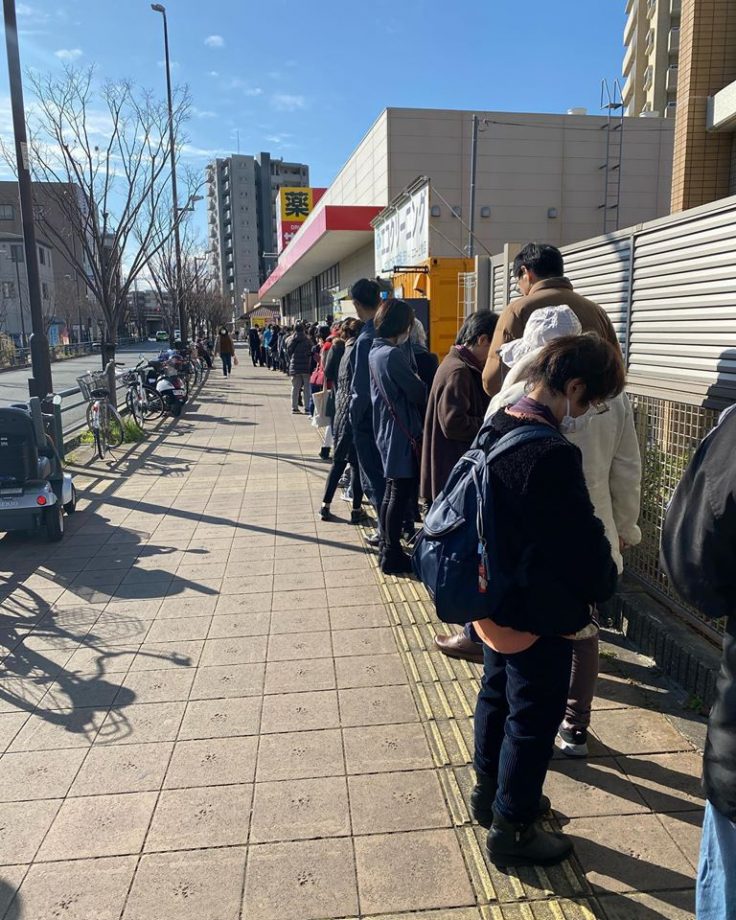Observations from Japan
In general
Compared to the Chinese “lockdown”, it is business as usual in Japan, almost as if nothing has happened. Since many Japanese people wear masks as protection against flu and/or hay fever, during the transition from winter to spring, it is now difficult to tell whether or not they are wearing masks because of COVID-19.
Personally, I am enjoying a lighter work load and more time to read and play the flute.
Shortage of toilet paper and masks
There was chaos two weeks ago when the government announced that there was a new virus going around in Japan and potentially other areas of the world and many Japanese started stock-piling toilet paper. There was also a shortage of masks during these two weeks. You could not find masks unless you joined a line before some medical shops even opened. There continues to be a short supply of masks to this day and many stores have signs stating that masks are currently out of stock.

People queue in front of medical shop. Source: Yanyin Zi
Work from home
Working from home is not a common practice in Japan. However, two weeks ago some larger companies have started to ask their employees to stay at home and try this system. Some Japanese object to forwarding information through emails because they feel it is inefficient and hinders their face-to-face time for discussion.
Cancellation of events and online lectures
At the university, commencement in March and opening ceremonies in April have all been cancelled. Most of the lectures that will begin in April will be held online. This is a big challenge for the university staff and lecturers, because most of them are not familiar with online teaching.
Many churches have also started to live stream their messages for Sunday services. No large public events have been held recently, which includes concerts and major sport events. Many Japanese people are still choosing to gather in small groups at restaurants and coffee shops after work and during the weekends.
Daily stress
For some of the Japanese people having extra free time could be a chance to take a good, long rest. Most of the domestic and international trips are cancelled, and many companies have shortened their business hours. For the workaholic Japanese society, this is a very rare situation.
It could be stressful for those who are used to going to the gym every day, and for those who have to take care of kids at home in small apartments all day. Not being able to complete their daily routine is sometimes very stressful for some Japanese people. Some people are claiming that staying at home all day is causing them to feel depressed because they are isolated from the rest of society.
The Olympics
Watching global news, even the Japanese are very surprised at the lose restrictions given by the Japanese government at this time. Some are worried that the infection rate could increase if people continue to move around as normal. Most people think that rush hour in the train is the most dangerous time of the day, with so many people all crowded together in one car. There is no chance to practice physical distancing then.
There is a rumour saying the Japanese government is not issuing stricter restrictions because they do not want to give people the impression that Japan is at risk. The government plans to host the Olympic games in 2021 summer, as they have already invested billions into it.
Decision making progress
In this season I have experienced the indecisiveness of Japanese bureaucracy. Universities need to listen to what the government says, before they can decide on when the semester will start. Second rank universities will look at what the top universities do, before they will make a decision. Departments will not give students any instructions, until the universities have given a statement. In this fluid situation, this kind of system brings a lot of confusion. When the department finally gives instructions to the students, the Corona situation might have changed again.
Written on March 21, 2020
Yanyin Zi is a research and education coordinator at Rikkyo University, Tokyo. She specializes in African Studies and Anthropology. (She has been researching about China-Africa relations since 2011 in Southern Africa) From September 2016 to February 2017, she was a JPSP research fellow at the GSSC, focused on human resource management in Asian companies in Africa and how employment relations shape Asia-Africa relations in large.































